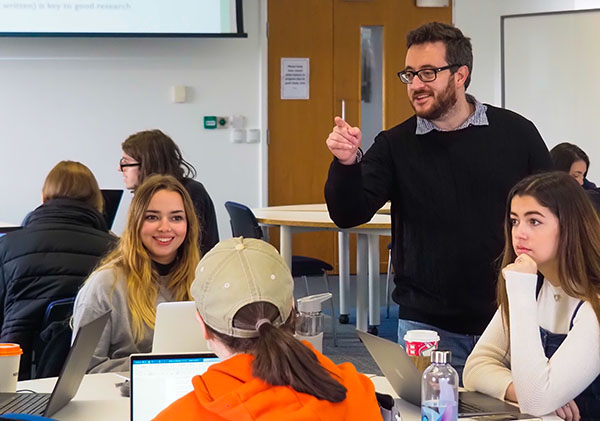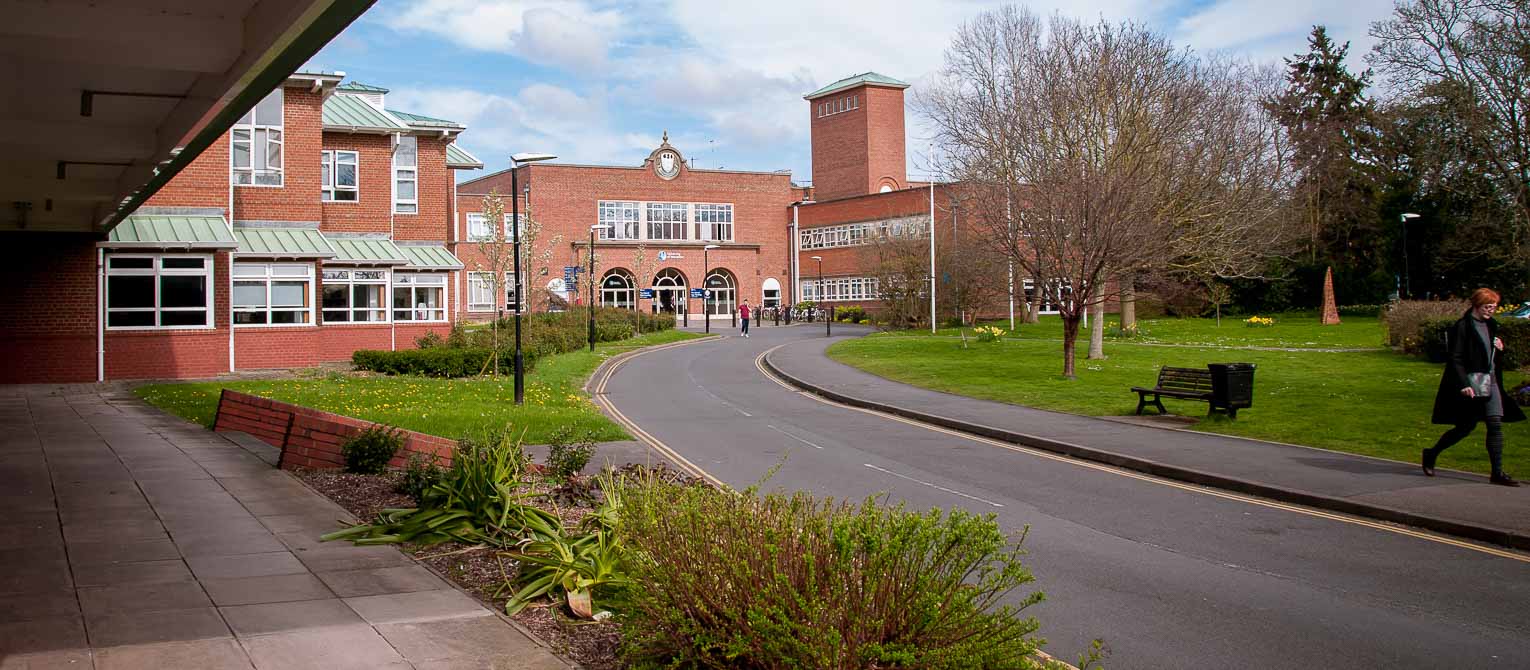We have an excellent reputation with schools in the region and have been training highly skilled, inspirational secondary teachers for over 75 years.
in the UK for Quality Education
Training bursary available for this subject*
We’ve been rated as ‘Outstanding’ in training primary and secondary teachers, the highest possible grade a provider can receive.
First for jobs
The University of Worcester is first in the UK for sustained employment, further study or both, five years after graduation (excluding specialist institutions) - Longitudinal Educational Outcomes Survey 2024. Read more.
Overview
Our Postgraduate Certificate in Education (PGCE) will prepare you to become an inspirational Religious Education teacher with varied school placements, interactive lesson simulations and tailored tutor support.
At Worcester, you’ll gain experience through placement in two different secondary school environments, teaching a range of secondary year groups, whilst receiving support from a subject mentor and University tutors.
When not on placement, you’ll be taught through a mixture of lectures, workshops and interactive subject sessions. In these interactive sessions, our tutors will model effective teaching and classroom management strategies. You’ll also get the opportunity to select one of our enhancement activities, these allow you to pursue a subject that's important to you – from Special Educational Needs and Disabilities (SEND) to climate change.
Beyond the classroom, we’ll enrich your subject knowledge of the Religious Education curriculum. Recent students have benefited from strong relationships with the local faith community, visited places of worship, and worked collaboratively with local religious education teachers to share best practices and discuss current issues as part of the Worcestershire RE Hub. We also arrange opportunities for students to deliver master classes in schools and present at national conferences.
When you successfully complete the course, you’ll receive Qualified Teacher Status (QTS), which means you will be recognised by the Teaching Regulation Agency as a fully qualified teacher.
Placements
You’ll complete a minimum of 120 days of placement, teaching Religious Education in two different schools, so you can experience a wide range of age groups and learning environments. There will also be additional school visit days where you can explore practical strategies for the classroom, with opportunities to practice, rehearse and then implement in school.
We have a strong relationship with over 100 partnership schools, where you will be supported by subject specialist mentors. School mentors are experienced teachers who we work with to make sure you get the highest quality, placement experience.
Regional Training Hubs
You can apply to study a PGCE directly with the University or with one of our partner Regional Training Hubs.
These Regional Training Hubs are networks of schools working together to train teachers. When you apply through a hub you will do a mix of training at their sites and at the University, and the hub will organise your placements within their network of schools.
Upcoming events
Course content
School experience is a substantial and integral part of the course, and you will have visit days and block placements in terms one, two, and three. The full-time course has 36 contact weeks in total, with 24 weeks of those weeks being spent in partnership schools. In addition, up to eight days will be spent in schools focusing on specific teaching skills.
Indicative themes explored through the course content are outlined below, although regular updates mean that exact modules may differ.
Careers
This course will qualify you to teach in secondary schools across the UK. Most of our students quickly find jobs after graduation, thanks to the confidence they’ve gained on the course, the connections they make on placement and our excellent reputation with schools in the Midlands region.
Many of our graduates go on to work in schools as an Religious Education teacher but our graduates also pursue leadership roles within schools, as curriculum leaders, special educational needs coordinators, key stage leaders, deputies, or head teachers.
The PGCE is an internationally recognised teaching qualification and can widen your opportunities for a career overseas. You’ll be able to seek work in countries such as America, Australia, and Canada.
Course highlights
Teaching and assessment
Teaching is a mix of interactive seminars, classroom simulations, and one-to-one tutorials. Alongside this, you’ll be supported by university staff and school mentors when out on placement. Your assessments will prepare you for a career as a teacher, and include creating a learning resource, delivering a presentation, and writing reflective essays.
Teaching and assessment contents
The PGCE Secondary programme enables all trainees to become autonomous learners. The course is designed to support trainees of varying experience, needs, and backgrounds, to develop key transferable skills, and to disseminate good practice in learning and teaching. To achieve this, we closely monitor the quality of your experience in university and on placement.
The course includes:
- School experience in a range of settings
- Professional Studies sessions in school and at university
- University-led workshops, lectures, seminars, fieldwork and guest lectures
- Study of key texts and supplementary reading
- Participation in high-level professional discussions, peer presentations and debate
- Directed studies, case studies and problem-solving tasks, which develop practice-based competence and skills of critical reflection through guided individual mentoring during placements
- One-to-one academic and personal tutorial support, including access to our excellent Library services and first-class Firstpoint services
Training enables you to acquire the knowledge and skills needed to teach within the subject specialism and age phase for which you are training. All successful trainees will meet the Department for Education Teachers' Standards (2013). These postgraduate programmes with QTS are designed to meet specific requirements laid down by the DfE and against which judgements by OFSTED inspections are made. It is also informed by and reflects the most recent legislation concerning the well-being of children and young people expressed in government legislation regarding Special Educational Needs and Disability and equality and diversity.
All trainees must spend 120 days in at least two contrasting schools or colleges. We find these placements for you and your subject tutor will visit you whilst on placement and deliver taught sessions in university.
Meet the team
You will be taught by a teaching team whose expertise and knowledge are closely matched to the content of the modules on the course.
You can learn more about the staff by visiting our staff profiles.
Student case studies
Some recent graduates reflect on their time on the course.
Entry requirements
Honours degree, normally 2:2 or higher from a United Kingdom higher education institution or equivalent qualification, in a relevant subject area. Applicants with a 3rd class degree will be considered on an individual basis.
GCSE grade C/4 in English Language or English Literature, Mathematics and Science, or equivalent qualifications. We do offer an equivalency test if you don’t have the required GCSE grade to apply for our courses.
Trainees who begin courses before providing evidence of the required GCSE standard (or equivalent) will not be eligible for financial incentives, such as bursaries or grants until they achieve the required standard.
Any questions?
If you have any questions about entry requirements, please call our Admissions Office on 01905 855111 or email admissions@worc.ac.uk.
Fees
Fees contents
UK
The Government has announced that it will increase tuition fees and maintenance loans by 3.1% from the 2025/26 academic cycle. Subject to approval, the University intends to increase our tuition fees in line with this and as per our terms and conditions. This means that from September 2025 the standard tuition fee for full-time UK students on a PGCE will be £9,535 per year*.
For more details on course fees, please visit our course fees page.
International and EU students
The standard tuition fee for full-time international and EU students enrolling on a PGCE in the academic year 2025/26 will be £17,900 per year*.
*Please note that for EU students who are not in receipt of a UK government bursary/scholarship package, the fee is £9,535 per year (subject to approval of the government's fee increase).
For more details on course fees, please visit our course fees page.
How to apply
How to apply contents
Applications for PGCE courses, both Primary and Secondary, should be made online through the government's Find Postgraduate Teacher Training website. The course code for Religious Education is 3CQH.
Visit the Get Into Teaching website for detailed information on how to apply for a PGCE.
Start your application
Apply PGCE Secondary Religious EducationYou can also apply to study a University of Worcester PGCE with one of our partner Regional Hubs.
Contact
If you have any questions, please get in touch. We're here to help you every step of the way.

Admissions Office
admissions@worc.ac.ukAdmissions Office
admissions@worc.ac.uk01905 855111More to explore
Open Days
Visiting us is the best way to get a feel for student life at the University of Worcester.

The City of Worcester
Worcester is a welcoming university city with great transport links and plenty of student parking.

Accommodation
Benefit from our accommodation guarantee. We have rooms on campus to suit every budget including en-suite options.
















